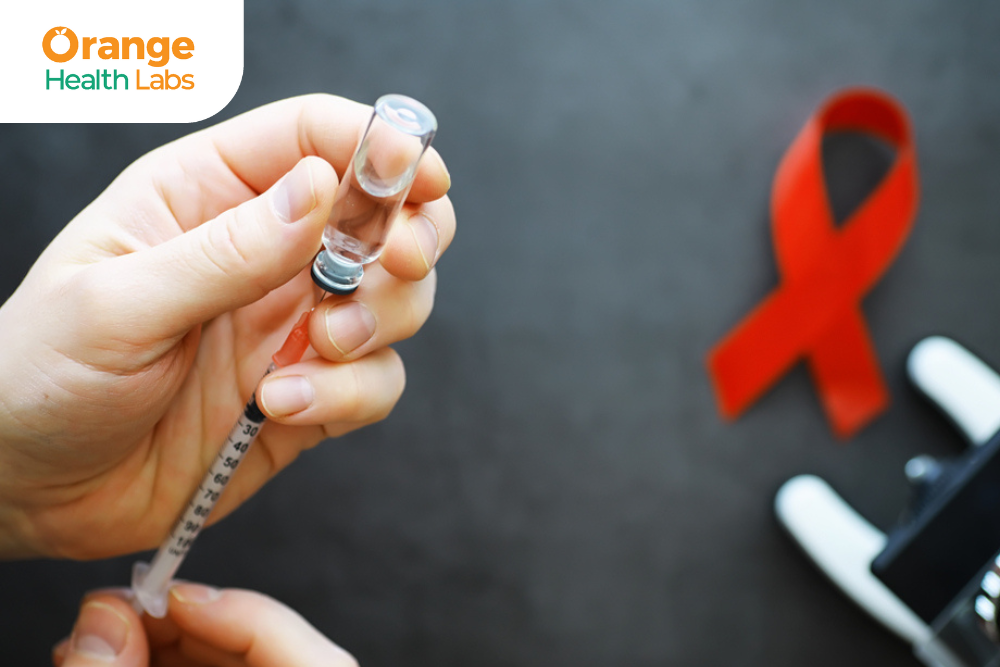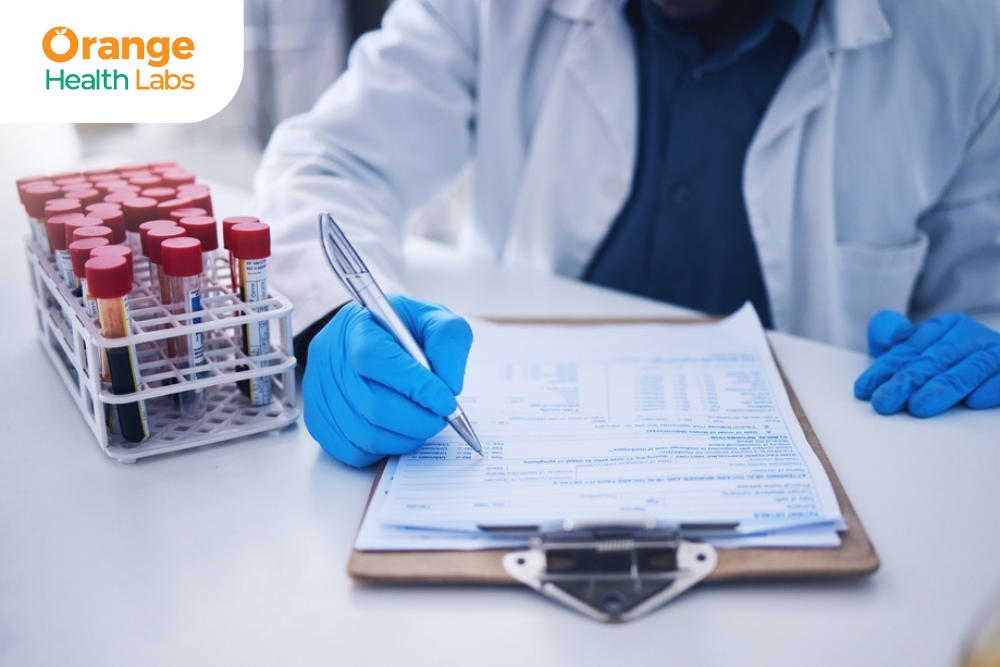Search for tests or checkups
SupportWhy HIV Testing Is Crucial for Everyone, Regardless of Risk

Introduction
HIV, or Human Immunodeficiency Virus, remains a significant public health concern globally. It is a virus that attacks the immune system, specifically targeting immune cells in the body. Despite advancements in treatment and prevention, HIV continues to have a profound impact on health, particularly in communities with limited access to healthcare resources. However, one of the biggest barriers to addressing HIV is the stigma associated with the virus and HIV testing.
The stigma surrounding HIV testing often prevents individuals from getting tested, leading to delayed diagnosis and treatment initiation. This stigma stems from fear, misinformation, discrimination, and societal attitudes towards HIV and those affected by it. Destigmatizing HIV testing is crucial for early detection and treatment of the disease. In this blog, we will explore the impact of HIV on the body, the importance of testing, and address some common misconceptions associated with HIV testing.
What is HIV and How Does it Affect the Body?
HIV is a sexually transmitted infection that infects and gradually destroys immune cells, which are essential for the proper functioning of the immune system. As the virus replicates and spreads throughout the body, it weakens the immune system, making it increasingly difficult for the body to fight off infections and diseases. It can spread through fluids in our body such as during sexual contact, pregnancy, breastfeeding, and sharing needles.
The progression of HIV can range from acute infection to chronic stage. Infected individuals may experience flu-like symptoms, such as fever, fatigue, sore throat, and swollen lymph nodes. However, not everyone will experience these symptoms, and they may go unnoticed. Without treatment, HIV enters a chronic stage and progresses to AIDS. AIDS is the most advanced stage of HIV infection, characterized by severe immunodeficiency and the presence of opportunistic infections such as tuberculosis, cancers, and several bacterial and fungal infections.
Common Misconceptions About HIV Transmission
There are several misconceptions surrounding HIV transmission, contributing to stigma, fear, and misinformation. Let us debunk common myths about HIV transmission:
| MYTHS | FACTS |
| Taking birth control means you won’t contract HIV. | Birth control does not offer protection against HIV. It is important to use protection during sexual activity. |
| HIV can spread through touching or kissing. | HIV does not spread through physical touch or kissing. HIV spreads primarily through specific bodily fluids, such as blood, semen, vaginal fluid, and breast milk. |
| HIV-positive women should not have babies. | There is risk of transfer of infection from mother to the baby during pregnancy, but there are options for HIV-positive women to have perfectly normal and healthy babies. Early prenatal care is essential to protect the baby from getting HIV. |
| It is safe to engage in unprotected sex if both partners are HIV positive. | Even if both partners are infected with HIV, it is necessary to ensure protection during intercourse. The use of a new condom for each sexual act along with medication adherence minimizes the chance of superinfection. |
| Being in a monogamous relationship means you can’t acquire HIV. | It is important to engage in honest and open conversations about monogamy with your partner and get tested together. |
| If your partner tested negative for HIV that means you don’t need to practice safe sex. | Remember to always practice condom use with any partner and to get tested along with your partner to reduce the likelihood of transmitting HIV. |
| Once you start HIV therapy, you can't transmit the virus to anyone else. | HIV treatment reduces the chance of passing HIV by 96%, but there is a 4% chance of transmission between an infected (virally suppressed) and an uninfected partner. |
| Having oral sex does not spread HIV/AIDS. | Even with oral sex, there is still a possibility of getting HIV, especially if the receptive partner has had recent dental work or has open sores/wounds. |
Why HIV Testing is Recommended for Everyone
HIV testing is a primary tool for ensuring quick diagnosis and making it a routine part of your testing ensures that you receive the treatment promptly in case of a positive diagnosis. Here are some benefits one can get with routine HIV screening:
Early Detection
Early diagnosis of HIV allows individuals to access treatment and support services during earlier stages of infection, significantly improving health outcomes and prolonging life expectancy.
Reducing the Spread
Regular HIV testing plays a crucial role in preventing the transmission of the virus by identifying individuals who are HIV positive and enabling them to take necessary precautions to protect themselves and others.
Encouraging Personal responsibility
With regular HIV testing, individuals can take control of their sexual health by prioritizing it. It also helps prevent the other sexually transmitted diseases and infections associated with HIV.
Overcoming the stigma
Routinizing HIV testing helps normalize conversations around sexual health and HIV prevention. By incorporating HIV testing as a standard part of primary care, healthcare providers can create an open and non-judgmental environment where patients feel comfortable discussing their sexual history and risk factors.
Recent advancements in HIV testing methods have made testing more accessible, convenient, and accurate, including rapid tests, self-testing kits, and point-of-care testing, enhancing early detection efforts and reducing barriers to testing.
Understanding Your HIV Testing Options
HIV testing encompasses various methods to detect the presence of the virus in the body. One common type of test is the HIV antibody test, which searches for HIV antibodies produced by the immune system in response to the virus. These antibodies can be found in blood, saliva, or urine samples. Different tests that can availed for HIV testing are:
- Lab Tests: Lab-based HIV antibody tests typically require a blood sample drawn from a vein. These tests are known for their accuracy and ability to detect antibodies earlier in the infection process compared to other methods. Results from lab tests are usually available within a few days after the sample is collected, providing a comprehensive assessment of HIV status.
- Rapid Tests: Rapid HIV antibody tests offer a quick and convenient way to obtain results. These tests utilize blood from a finger prick, saliva, or urine samples and provide results in approximately 30 minutes. While rapid tests offer speed, they may not be as sensitive as lab-based tests in detecting early HIV infection.
- At-Home Tests: HIV tests at home provide individuals with the convenience of testing in the privacy of their own homes. These tests come in two forms: rapid self-test kits and mail-in tests. With rapid self-test kits, individuals collect and test a sample of saliva themselves, receiving results within minutes, however with the mail-in type, the sample may be self-collected but it is sent to a lab for analysis.
Testing for HIV is widely available at clinics, hospitals, private laboratories, community health centres, and specialized HIV testing centres. Many organizations offer confidential and anonymous testing services, ensuring privacy and support throughout the testing process.
How to Approach HIV Testing
Preparing mentally and emotionally for an HIV test is important. It's normal to feel anxious or nervous before testing but remember that knowing your HIV status empowers you to take control of your health. Consider talking to a trusted friend or counsellor and educate yourself about the testing process and what to expect.
During the testing process, a healthcare provider will collect a sample of blood, saliva, or urine, depending on the type of test being used. Results may be available within minutes for rapid tests or may take a few days for traditional lab tests.
It's essential to understand the result of an HIV test correctly. If the HIV test result is positive, it indicates the presence of HIV antibodies in the blood. A negative result suggests the absence of detectable HIV antibodies. This may require repeat testing as one may be infected, but their bodies might not have developed sufficient antibodies against HIV. Regardless of the result, support and counselling services are available to help individuals navigate their next steps.
Conclusion
HIV testing is a vital component of overall health and well-being, benefiting both individuals and communities. By knowing your HIV status, you can access timely treatment and support services, reduce the risk of transmission to others, and contribute to a healthier society. We encourage everyone to take charge of their health by getting tested regularly and advocating for accessible testing services for all. Together, we can work towards ending the stigma surrounding HIV and achieving an AIDS-free generation.
Book HIV Test in your city: HIV Test in Mumbai | HIV Test in Bangalore | HIV Test in Noida | HIV Test in Hyderabad | HIV Test in Gurgaon | HIV Test in Faridabad | HIV Test in Delhi

The Role of HIV Testing in Preventing the Spread of HIV

The Role of CBC Tests in Monitoring Treatment Efficacy
